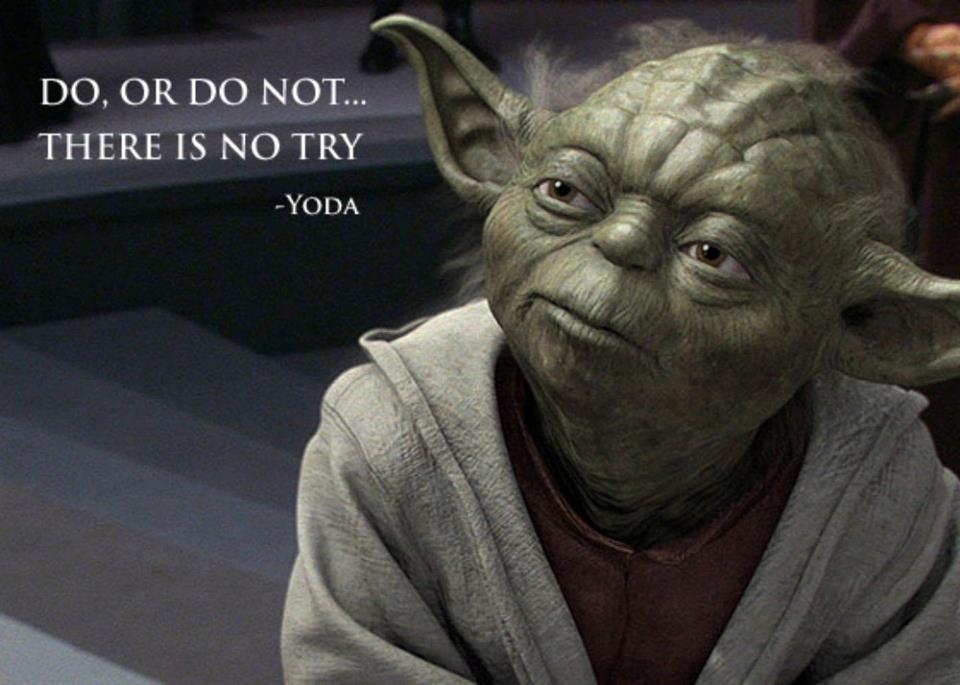If you are a Star Wars fan, you’ll recognize this title as part of Yoda’s famous proverb: “Do. Or do not. There is no try.” I’m borrowing this from Yoda and applying it to how Scripture comes to life when we are faced with the hard things.
One of my avenues for ministry for many years has been my work as a Licensed Professional Counselor. In the initial stages of therapy, it is essential to help clients to identify, define, and refine their goals in life and use those goals to inform the goals for therapy. Much is revealed in the process about the client’s worldview, values, history, and temperament. If we skip over this important step, both client and therapist may wind up frustrated or unsatisfied, because neither of us is clear about where we are headed. We may have to readjust the coordinates later, but it’s good to start with at least a tentative destination in mind.
As I listen carefully and reflectively, I often hear about a set of struggles—with depression, with anxiety, with relationship dysfunction, with spiritual stagnation, or with unresolved grief or trauma. I find that most people tell the same story many times, to themselves and to various people in their lives, before they wind up in my office telling it to me. How can I respond in a way that feels more helpful or hopeful than the responses they’ve already heard?
One way I do this is with a wonderful thing I call “reframing.” And one of the most common reframes is replacing the language of “trying” with the language of “training.” This idea is not original with me, of course. Any motivational speaker or coach worth his or her salt knows that while we are in trying mode, we are usually spinning our wheels in neutral; we haven’t shifted into gear. Training implies action. It gets us moving.
Maybe it’s a man who says, “I’m trying to be more loving toward my wife, but nothing I do seems to make a difference.” Or the grown daughter who says, “I’m trying to forgive my Dad for his abuse, but how can I when he’s never taken responsibility for it?” Or the college student who says, “I’m trying to keep up with everything, but every day I still feel overwhelmed with anxiety and worry.” Or the Mom who says, “I’m trying to get back on track with the Lord, but I have no time alone to study or pray!”
Scripture does not tell husbands to try to love their wives. It says simply to love them (Eph. 5:25). The Bible does not command us to try to forgive others. It says we are to forgive them, because we have been forgiven (Lk. 6:37; Eph. 4:32). The word does not tell us to try not to be anxious, it says, “Don’t be anxious” (Phil 4:6). Scripture does not suggest that we try to pursue the Lord, but that he rewards those who “diligently seek him” (Heb. 11:6).
When we don’t think we can meet the standards found in the word of God, we fool ourselves thinking we gain some wiggle room by telling ourselves and others that at least we are trying really hard. (I’m using the first-person pronoun because I’ve been there myself, believe me.) It allows us to procrastinate, chicken out, make excuses, justify not fulfilling commitments we’ve made to ourselves, other people, or the Lord.
Moses tells the Israelites before they cross over the Jordan that they are not obligated to make vows to the Lord. But if they chose to make them, there would be severe consequences for not fulfilling them promptly (Deut. 23:21). The same principle applies to us as Christ-followers. We don’t try to do what we say we are going to do. We do it.
Well Ruth, you say, what if it feels like there is a huge gap between where I want to be and where I am? What if I don’t even know how to begin? Isn’t trying better than doing nothing at all?
John Ortberg, in his book about spiritual disciplines, The Life You’ve Always Wanted, gives a couple of good examples that illustrate the answer. Instead of trying, we get into training.
If you wanted to run a marathon, but you’d never been a runner, it would be foolish to say, “I’m going to try to run a marathon.” No, what you would do is get into training. You would start by running small distances, gradually increasing the distances until you had trained your muscles and cardiovascular system to endure 26 miles of running. Or if you wanted to play the Brandenburg Concerto on the piano and had never touched a piano, you wouldn’t say you were going to try to play the concerto. You would look around for the best teacher to train you in proper technique, reading music, etc., and you’d play simpler pieces, progressively working up to the skill level needed to play Bach’s masterpiece.
If loving the people in your life is difficult, don’t resort to trying to do so. This is a failing strategy. But if you accept God’s discipline, and will submit to it, you will find that he can train you to guard your heart against bitterness. You can be trained to guard your mouth from speaking out of cruelty or contempt. Holy Spirit will guide your steps into acts of love and kindness. Before you know it, you have changed from the inside out. Loving others has become a trained, conditioned response. When you fail, you don’t quit. You press on with the discipline of loving because it is what God expects of you. No excuses.
Likewise, with forgiveness. Train yourself by speaking prayers of forgiveness toward those who have wronged you each day. Pretty soon you will find that this becomes more than mere words; it becomes a transformative truth that replaces bitterness. You’ll probably also find that you feel much more healthy and free, because you’ve purged out the poison of unforgiveness.
In the case of anxiety, if you move forward with all the courage you have, “doing it anyway,” confronting the things that trigger fear, you train your heart to be courageous. And if you are like the Mom who is spiritually stuck, find a new, refreshing way to connect with the Lord, and do that for at least 21 days (the amount of time behavioral psychologists agree it takes to develop a new habit), and you will have likely trained yourself back into a state of greater spiritual vitality.
All of these training curricula take time, some a lot, and some just a little, depending on your starting place and the size of the goal. All growth and change is a process. But trying is not the method of engagement. We gain ground by submitting to the loving discipline of the Lord, allowing him to train us in love, faith, holiness, and courage.
_________________________________________
Is there an area of life you recognize you have been trying to change, and have so far failed to do so? Can you apply this principle of training instead? Could this be a helpful reframe for you?






